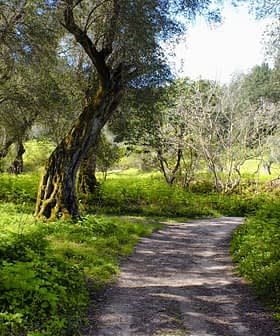In Western Greece, Hail Punches Olives to the Ground Just Before Harvest
Stormy weather in western parts of Greece pummeled olive trees at the worst possible moment.
The recent unsettled weather in western Greece, along with the floods it brought and the tragic toll on human lives it took in Attica, did not leave the olive crop unaffected. The storm called Eurydice that hammered many parts of the country brought along strong winds, rain and hail.
And while some rain can be highly appreciated by olive growers, hail is something they fear most for obvious reasons: it hits hard on the trees and causes a lot of damage, not only on the fruits but on the branches and the leaves as well, rendering the trees susceptible to disease such as pathogens that use the wounds as a gateway to infect the plants.
In many areas, olives fell to the ground after gales and hailstorms had swept the olive groves. In the Aetolia-Acarnania region, north of Patras, approximately 12,000 olive trees were hit by hail which caused almost total destruction. Extended damages were reported near Messolongi, Agrinio, and the lowlands of Neochorio, where table olives of the Kalamon cultivar are grown.
In the Ilia region in Peloponnesus, hailstones the size of small nuts hit olive trees at higher levels and put local producers in despair. Half an hour of hail was enough for the olives to fall to the ground and many groves were covered by a thick carpet of olive fruit.
Even the fruit that remained on the olive trees were harmed. On top of that, the wind swept the trees of their leaves.
The current harvesting season was about to begin and it was eagerly anticipated because the yield was expected to be more than satisfactory, but the hail was an onslaught that producers had not seen coming.
Other areas in the country were hit by the stormy weather like the island of Corfu and the regions of Argolida, Korinthia, Messinia, and Lakonia.
Many olive and citrus groves were damaged, especially in western Mani, part of the Messinia region, where major damage was inflicted on the trees at a time that most producers were just starting to harvest.
Nothing similar had happened there for at least seventy years, the locals said.
Olive oil growers and producers will be eligible for compensation, and the local authorities have started to inspect the affected areas and document the damage.
The weather forecast for the following couple of weeks predicts a shift to colder conditions with no rain in most parts of Greece, so producers will hopefully be able to harvest olives with the weather on their side.








